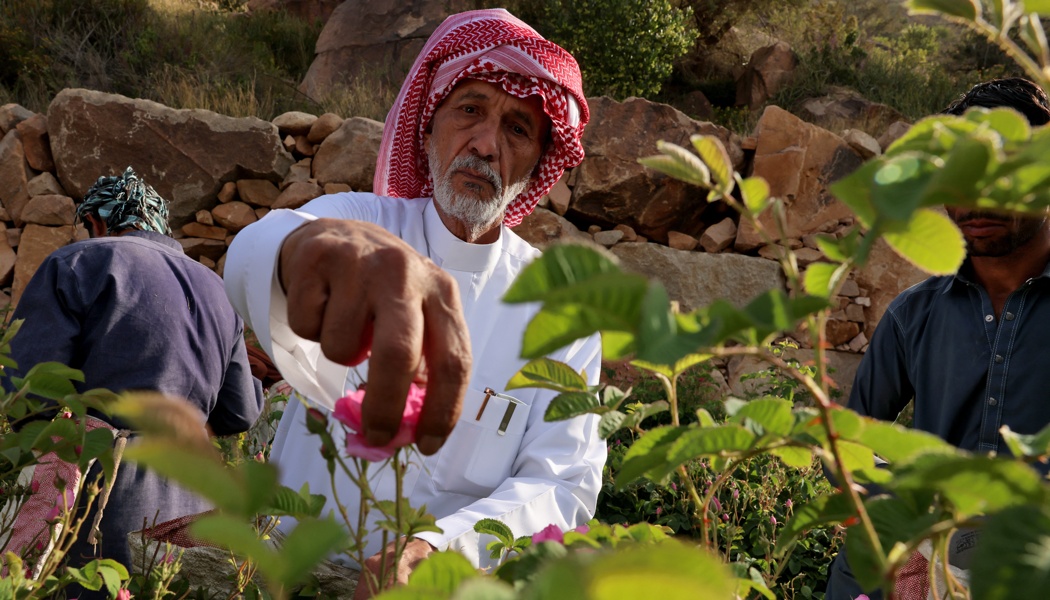Located at an altitude of some 1,700 meters in western Saudi Arabia, the Taif area plays an active role in the agricultural output of the kingdom. Thanks to its relatively mild climate, it is renowned for its cultivation of grapes, pomegranate, figs, and roses. Taif is also very active in the manufacturing of traditional attar, and is known locally as “City of the Roses”.
The arrival of spring’s mild climate is met with the blooming of roses that carpet the vast, rolling desert landscapes with vibrant shades of pink. The blooms are then hand-picked from daybreak to late in the evening by an army of labourers.
The petals are soaked and boiled for hours in vats, where the rose’s scent is extracted through an intricate process capturing the steam that is then distilled into a highly prized aromatic oil.
The perfume of Mecca
The flowers have long been used to make rose water to wash the walls of the Kaaba at the Grand Mosque in Mecca, and perfumes made from Taif roses are popular with pilgrims visiting the kingdom.
“The quantity of Taif roses is small, so only limited amounts are exported because it’s not enough to meet local demand. Here in Saudi Arabia, we have many rose lovers who only prefer rose perfume,” emphasized Khalaf Allah al-Talhi, a 80-year-old farmer who has spent decades pruning thorny bushes and working arduous harvests in his flower farm.
A modest quantity of oil is exported to craft perfumes or to be added to cosmetic products such as moisturisers and soaps. According to the economic database TrendEconomy, Saudi Arabia in 2023 exported just USD 141 million worth of perfume products, which includes rosewater.
At harvest time, workers on Talhi’s farm pick tens of thousands of flowers daily. “We were born on farms and have always worked in agriculture,” said Talhi, wearing a white robe and a red checkered headscarf.
Climate change
But now the greater frequency of erratic weather — including searing summer heat, frigid winters and unexpected flooding — presents a potent threat to Taif’s famed roses.
Climate scientists have issued regular warnings that every fraction of a degree of global warming increases the intensity and frequency of extreme weather events such as heatwaves, heavy rainfall and droughts.
Saudi Arabia, with its arid climate and vast deserts, is particularly vulnerable. “Climate change accelerates soil degradation in processes such as salinisation, erosion, and desertification, which diminishes the quality and productivity of arable land in Saudi Arabia,” read a report published by the Atlantic Council.
The think tank estimated that wheat yields were expected to decline by 20 to 30 percent by 2050 in Saudi Arabia because of heat stress and not enough irrigation water, while reductions are also expected for date palms and other staple crops.
The weather in the deserts around Taif has been no exception, according to Talhi. “Last year and the year before, it was extremely cold. Some farmers didn’t harvest a single flower from their fields.“
Thankfully, this season has been more forgiving. “There are weather changes, but this year the conditions have been very mild,” he said.
While the weather may now be less reliable, Talhi himself has proven to be a source of stability. Despite his advancing years, the octogenarian rises every day before sunrise to work the fields alongside his staff, and he often labours away until late into the night. “This farm is my soul and beating heart,” he told AFP. “God willing, nothing will separate me from it, except death.“

